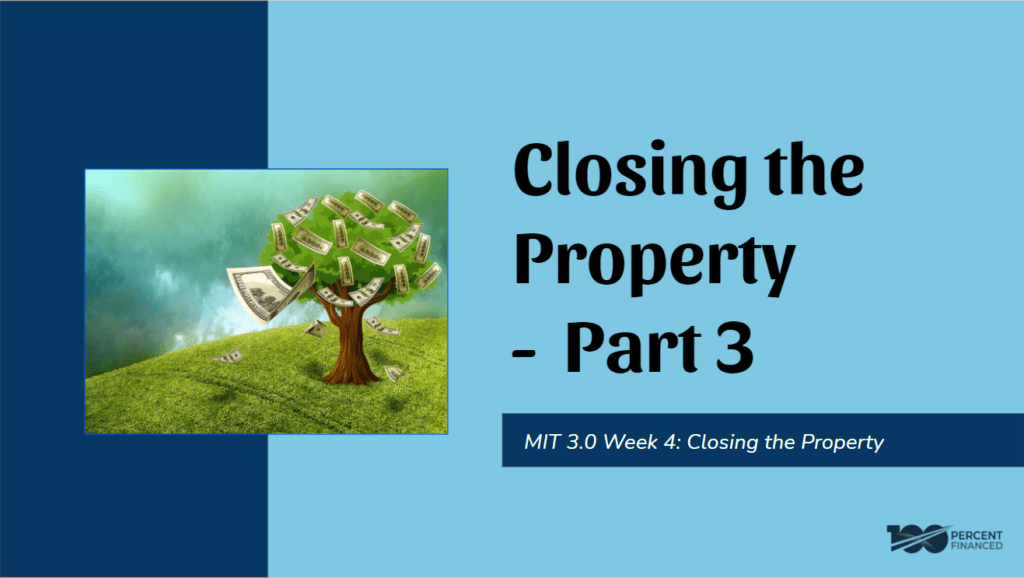Have a Question?
MIT 3.0
4.3 Closing the Property
Cheat Sheet
Asset Management
- As the asset manager, if you’ve outsourced property management, then you manage the property management company who manages the contractors and tenants. If you self-manage, then you manage the property, contractors, and the tenants to maximize performance.
- If you closed on a property with Limited Partners (LPs), then set up weekly calls with the LPs for the first two months. Reduce the calls to once a month thereafter. With each call, you should update your partners with the following property information:
- Income received since the last time you reported to them
- Expenses incurred since the last time you reported to them
- Profit received since the last time you reported to them
- We recommend not to touch any of your profits in the first year; instead, use the cashflow to build reserves
- After owning the property for 1 year, proceed with paying LPs on a quarterly basis
- Distribution of payouts and the date of the next payout
- Repairs incurred since the last time you reported to them
- Overall Performance since the last time you reported to them
- Update the Schedule E weekly and share the LP Financial Workbook via google sheets (comment access) with LPs
- Set up automatic bill pay accounts for services that you as the owner is responsible for paying for, but be sure to review the monthly statements for accuracy
- Property taxes
- Mortgage
- Utilities: Gas, Light, Water, Trash, etc
- After every deal you close, update your Personal Financial Statement, Creed, and your Financial Freedom Goal based on the current status of your affairs
- Inspect the property twice a year: Early Spring (make sure HVAC works) and Early Fall (make sure heating works)
- Increase revenue and decrease expenses where you can, then every six months check the appraised value to see if it meets refinance requirements
- Begin focusing on “Finding the money” for the next deal once this current deal is stabilized
Exit Strategy
- In your operational plan (OP), schedule when the Seller Financing, Business Credit, and Private Money matures, so that the money you’ve put to the side as reserves can be used to pay these forms of debt service off before the maturity date.
- Put clauses in place (see Seller Financing Note) for private money and seller financing for contingencies that relate to you being able to extend the financing repayment if you’re unable to pay off the debt by the maturity date just in case you need additional time to pay off the debt when the time comes
- Schedule in your OP yearly rent increases according to lease renewal dates
- You must notify tenants (or public assistance) at least 60 days prior to the expiration of the lease with any rent increases.
- If tenants don’t agree to rent increase and there’s 60 days prior to the expiration of the lease, then exercise your right to show the property twice a week to new tenants and find a new tenant who will pay the increased rent
- Lower expenses that you as the owner is responsible for paying for (but not at the cost of lowering quality)
- Reduce taxes by contesting them
- Reduce utilities
- Water conservation kits
- Reduce size of toilet tanks to save water
- Energy efficient light bulbs
- Ensuring property is well insulated if you pay for heat
- Reduce insurance by bundling home, auto, and even property insurance
- Be aggressive with using cash flow to pay down debt (if LPs agree)
- After you saved up all of your cash flow in year 1 of owning the property, then consider using the all of the cashflow (or a percentage of the cashflow if you and your partners want to reward yourself for your efforts) to pay down the most expensive debt you have that has the closest maturity date
- Every six months
- Contact mortgage companies to see if you’re eligible for a cash out refinance
- Seek advice from mortgage brokers as to when is a good time for you to scale your business to do commercial
- Once you’ve acquired more funds, contact deal finders every six months for more deals
- Apply for funding
- Business credit
- Consider selling the property
- If there are extensive repairs needing to be done
- If occupancy rates decrease due to job relocation
- If property is on the last leg or gets on your last nerves
- As your business grows, expand your network and team
- Have six months of reserves for each property (as well as for personal living expenses) and repeat the Cash Flow Cycle every six months
- Once you reach financial stability, submit your two-week notice to your employer
“If you’d like to learn more, click here”
Copyright @ 2021 by 100percentfinanced.com
All rights reserved. No part of this publication may be reproduced, distributed, or transmitted in any form or by any means, including photocopying, recording, or other electronic or mechanical methods, without the prior written permission of the publisher.


